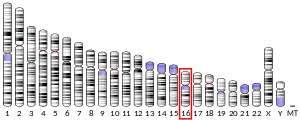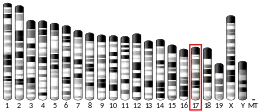ZNF598
Zinc finger protein 598 (ZNF598) is a protein that in humans is encoded by the ZNF598 gene.[5]
| ZNF598 | |||||||||||||||||||||||||||||||||||||||||||||||||||
|---|---|---|---|---|---|---|---|---|---|---|---|---|---|---|---|---|---|---|---|---|---|---|---|---|---|---|---|---|---|---|---|---|---|---|---|---|---|---|---|---|---|---|---|---|---|---|---|---|---|---|---|
| Identifiers | |||||||||||||||||||||||||||||||||||||||||||||||||||
| Aliases | ZNF598, zinc finger protein 598, HEL2, zinc finger protein 598, E3 ubiquitin ligase | ||||||||||||||||||||||||||||||||||||||||||||||||||
| External IDs | OMIM: 617508 MGI: 2670965 HomoloGene: 5672 GeneCards: ZNF598 | ||||||||||||||||||||||||||||||||||||||||||||||||||
| |||||||||||||||||||||||||||||||||||||||||||||||||||
| |||||||||||||||||||||||||||||||||||||||||||||||||||
| |||||||||||||||||||||||||||||||||||||||||||||||||||
| |||||||||||||||||||||||||||||||||||||||||||||||||||
| Wikidata | |||||||||||||||||||||||||||||||||||||||||||||||||||
| |||||||||||||||||||||||||||||||||||||||||||||||||||
Function
Zinc-finger proteins bind nucleic acids and play important roles in various cellular functions, including cell proliferation, differentiation, and apoptosis. This protein and Grb10-interacting GYF protein 2 have been identified as a components of the mammalian 4EHP (m4EHP) complex.[6] The complex is thought to function as a translation repressor in embryonic development. ZNF598 and its yeast homologue Hel2 are ubiquitin ligases that ubiquitinate the 40S ribosomal subunit during ribosome-associated protein quality control.[7][8][9][10]
References
- GRCh38: Ensembl release 89: ENSG00000167962 - Ensembl, May 2017
- GRCm38: Ensembl release 89: ENSMUSG00000041130 - Ensembl, May 2017
- "Human PubMed Reference:". National Center for Biotechnology Information, U.S. National Library of Medicine.
- "Mouse PubMed Reference:". National Center for Biotechnology Information, U.S. National Library of Medicine.
- "Entrez Gene: Zinc finger protein 598".
- Morita, Masahiro; Ler, Lian Wee; Fabian, Marc R.; Siddiqui, Nadeem; Mullin, Michael; Henderson, Valerie C.; Alain, Tommy; Fonseca, Bruno D.; Karashchuk, Galina; Bennett, Christopher F.; Kabuta, Tomohiro; Higashi, Shinji; Larsson, Ola; Topisirovic, Ivan; Smith, Robert J. (September 2012). "A novel 4EHP-GIGYF2 translational repressor complex is essential for mammalian development". Molecular and Cellular Biology. 32 (17): 3585–3593. doi:10.1128/MCB.00455-12. ISSN 1098-5549. PMC 3422012. PMID 22751931.
- Juszkiewicz S, Hegde RS (February 2017). "Initiation of Quality Control during Poly(A) Translation Requires Site-Specific Ribosome Ubiquitination". Molecular Cell. 65 (4): 743–750.e4. doi:10.1016/j.molcel.2016.11.039. PMC 5316413. PMID 28065601.
- Sundaramoorthy E, Leonard M, Mak R, Liao J, Fulzele A, Bennett EJ (February 2017). "ZNF598 and RACK1 Regulate Mammalian Ribosome-Associated Quality Control Function by Mediating Regulatory 40S Ribosomal Ubiquitylation". Molecular Cell. 65 (4): 751–760.e4. doi:10.1016/j.molcel.2016.12.026. PMC 5321136. PMID 28132843.
- Sitron CS, Park JH, Brandman O (May 2017). "Asc1, Hel2, and Slh1 couple translation arrest to nascent chain degradation". RNA. 23 (5): 798–810. doi:10.1261/rna.060897.117. PMC 5393187. PMID 28223409.
- Matsuo Y, Ikeuchi K, Saeki Y, Iwasaki S, Schmidt C, Udagawa T, Sato F, Tsuchiya H, Becker T, Tanaka K, Ingolia NT, Beckmann R, Inada T (July 2017). "Ubiquitination of stalled ribosome triggers ribosome-associated quality control". Nature Communications. 8 (1): 159. Bibcode:2017NatCo...8..159M. doi:10.1038/s41467-017-00188-1. PMC 5534433. PMID 28757607.
This article incorporates text from the United States National Library of Medicine, which is in the public domain.



